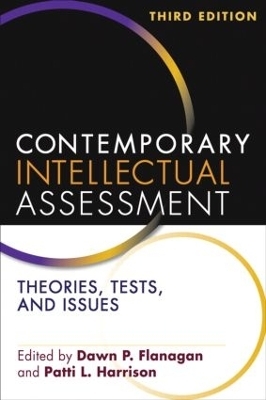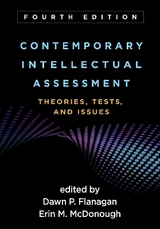
Contemporary Intellectual Assessment, Third Edition
Guilford Publications (Verlag)
978-1-60918-995-2 (ISBN)
- Titel erscheint in neuer Auflage
- Artikel merken
Dawn P. Flanagan, PhD, is Professor of Psychology and Director of the School Psychology Training Programs at St. John’s University in Queens, New York. She is also Assistant Clinical Professor at the Yale Child Study Center. Dr. Flanagan serves as an expert witness, learning disability consultant, and psychological test and measurement consultant and trainer, and has published widely on cognitive assessment, specific learning disabilities, and psychometric theories of the structure of cognitive abilities. Patti L. Harrison, PhD, is Professor in the Department of Educational Studies in Psychology, Research Methodology, and Counseling at the University of Alabama. She has conducted research on intelligence, adaptive behavior, and preschool assessment. Dr. Harrison has published and presented on assessment topics in school psychology, clinical psychology, and special education venues. She is a past editor of School Psychology Review.
I. The Origins of Intellectual Assessment
1. A History of Intelligence Assessment: The Unfinished Tapestry, John D. Wasserman
2. A History of Intelligence Test Interpretation, Randy W. Kamphaus, Anne Pierce Winsor, Ellen W. Rowe, and Sangwon KimII. Contemporary Theoretical Perspectives
3. Foundations for Better Understanding of Cognitive Abilities, John L. Horn and Nayena Blankson
4. The Cattell–Horn–Carroll (CHC) Model of Intelligence, W. Joel Schneider and Kevin S. McGrew
5. Assessment of Intellectual Profile: A Perspective from Multiple-Intelligences Theory, Jie-Qi Chen and Howard Gardner
6. The Triarchic Theory of Successful Intelligence, Robert J. Sternberg
7. Planning, Attention, Simultaneous, Successive (PASS): A Cognitive Processing–Based Theory of Intelligence, Jack A. Naglieri, J. P. Das, and Sam GoldsteinIII. Contemporary Intelligence, Cognitive, and Neuropsychological Batteries (and Associated AchievementTests)
8. The Wechsler Adult Intelligence Scale–Fourth Edition (WAIS-IV) and the Wechsler Memory Scale–Fourth Edition (WMS-IV), Lisa Whipple Drozdick, Dustin Wahlstrom, Jianjun Zhu, and Lawrence G. Weiss
9. The Wechsler Preschool and Primary Scale of Intelligence–Third Edition (WPPSI–III), the Wechsler Intelligence Scale for Children–Fourth Edition (WISC–IV), and the Wechsler Individual Achievement Test–Third Edition (WIAT–III), Dustin Wahlstrom, Kristina C. Breaux, Jianjun Zhu, and Lawrence G. Weiss
10. The Stanford–Binet Intelligence Scales, Fifth Edition (SB5), Gale H. Roid and Mark Pomplun
11. The Kaufman Assessment Battery for Children–Second Edition (KABC-II) and the Kaufman Test of Educational Achievement–Second Edition (KTEA-II), Jennie Kaufman Singer, Elizabeth O. Lichtenberger, James C. Kaufman, Alan S. Kaufman, and Nadeen L. Kaufman
12. The Woodcock–Johnson III Normative Update (WJ III NU): Tests of Cognitive Abilities and Tests of Achievement, Fredrick A. Schrank and Barbara J. Wendling
13. The Differential Ability Scales–Second Edition (DAS-II), Colin D. Elliott
14. The Universal Nonverbal Intelligence Test (UNIT): A Multidimensional Nonverbal Alternative for Cognitive Assessment, R. Steve McCallum and Bruce A. Bracken
15. The Cognitive Assessment System (CAS): From Theory to Practice, Jack A. Naglieri and Tulio M. Otero
16. The Reynolds Intellectual Assessment Scales (RIAS) and the Reynolds Intellectual Screening Test (RIST), Cecil R. Reynolds, Randy W. Kamphaus, and Tara C. Raines
17. The NEPSY-II, Robb N. Matthews, Cynthia A. Riccio, and John L. Davis
18. The Wechsler Nonverbal Scale of Ability (WNV): Assessment of Diverse Populations, Jack A. Naglieri and Tulio M. OteroIV. Contemporary Interpretive Approaches and Their Relevance for Intervention
19. The Cross-Battery Assessment (XBA) Approach: An Overview, Historical Perspective, and Current Directions, Dawn P. Flanagan, Vincent C. Alfonso, and Samuel O. Ortiz
20. Cognitive Hypothesis Testing (CHT): Linking Test Results to the Real World, Catherine A. Fiorello, James B. Hale, and Kirby L. Wycoff
21. Processing Approaches to Interpreting Information from Cognitive Ability Tests: A Critical Review, Randy G. Floyd and John H. Kranzler
22. Testing with Culturally and Linguistically Diverse Populations: Moving beyond the Verbal–Performance Dichotomy into Evidence-Based Practice, Samuel O. Ortiz, Salvador Hector Ochoa, and Agnieszka M. Dynda
23. Linking Cognitive Abilities to Academic Interventions for Students with Specific Learning Disabilities (SLD), Nancy Mather and Barbara J. WendlingV. Assessment of Intelligence and Cognitive Functioning in Different Populations
24. Cognitive Assessment in Early Childhood: Theoretical and Practical Perspectives, Laurie Ford, Michelle L. Kozey, and Juliana Negreiros
25. Use of Intelligence Tests in the Identification of Giftedness, David E. McIntosh, Felicia A. Dixon, and Eric E. Pierson
26. Use of Ability Tests in the Identification of Specific Learning Disabilities (SLD) within the Context of an Operational Definition, Dawn P. Flanagan, Vincent C. Alfonso, Jennifer T. Mascolo, and Marlene Sotelo-Dynega
27. Assessment of Intellectual Functioning in Autism Spectrum Disorder (ASD), Laura Grofer Klinger, Sarah E. O’Kelley, Joanna L. Mussey, Sam Goldstein, and Melissa DeVries
28. Cognitive and Neuropsychological Assessment of ADHD: Redefining a Disruptive Behavior Disorder, James B. Hale, Megan Yim, Andrea N. Schneider, Gabrielle Wilcox, Julie N. Henzel, and Shauna G. Dixon
29. Intellectual and Neuropsychological Assessment of Individuals with Sensory and Physical Disabilities and Traumatic Brain Injury, Scott L. Decker, Julia A. Englund, and Alycia M. Roberts
30. Use of Intelligence Tests in the Identification of Children with Intellectual and Developmental Disabilities (IDD), Kathleen Armstrong, Jason Hangauer, and Joshua NadeauVI. Contemporary and Emerging Issues in Intellectual Assessment
31. Using Joint Test Standards to Evaluate the Validity Evidence for Intelligence Tests, Jeffery P. Braden and Bradley C. Niebling
32. Using Confirmatory Factor Analysis (CFA) to Aid in Understanding the Constructs Measured by Intelligence Tests, Timothy Z. Keith and Matthew R. Reynolds
33: The Emergence of Neuropsychological Constructs into Tests of Intelligence and Cognitive Abilities, Daniel C. Miller and Denise E. Maricle
34. The Role of Cognitive and Intelligence Tests in the Assessment of Executive Functions, Denise E. Maricle and Erin Avirett
35. Intelligence Tests in the Context of Emerging Assessment Practices: Problem-Solving Applications, Rachel Brown-Chidsey and Kristina J. Andren
36. Intellectual, Cognitive, and Neuropsychological Assessment in Three-Tier Service Delivery Practices in Schools, George McCloskey, James Whitaker, Ryan Murphy, and Jane Rogers
Appendix. The Three-Stratum Theory of Cognitive Abilities, John B. Carroll
| Verlagsort | New York |
|---|---|
| Sprache | englisch |
| Maße | 178 x 254 mm |
| Gewicht | 1800 g |
| Themenwelt | Geisteswissenschaften ► Psychologie ► Allgemeine Psychologie |
| Geisteswissenschaften ► Psychologie ► Entwicklungspsychologie | |
| Medizin / Pharmazie ► Medizinische Fachgebiete ► Pädiatrie | |
| Medizin / Pharmazie ► Medizinische Fachgebiete ► Psychiatrie / Psychotherapie | |
| ISBN-10 | 1-60918-995-7 / 1609189957 |
| ISBN-13 | 978-1-60918-995-2 / 9781609189952 |
| Zustand | Neuware |
| Haben Sie eine Frage zum Produkt? |
aus dem Bereich



